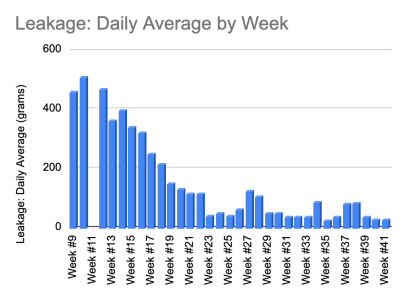Hello Mattsmith3134,
What you are experiencing is normal for your stage of recovery. In the first month after my catheter was removed, the leaking was continuous. The most important thing for you to do is remember that your body has been through a traumatic event, and it is going to take many months to fully recover.
I'm 61 and was very active before my surgery. I was leaking on average 7 to 8 ounces a day in my first month. By the second month, the leaking was down to 2 to 3 ounces a day. By the third month, it was down to less than an ounce per day. This Wednesday makes 4 months, and 3 weeks, I still leak a little. It happens very spontaneously, almost like I get a little bladder spasm, resulting in a spurt.
It does get better, but you need to give yourself time to heal. Walking and Kegels are especially important to your recovery.
Regarding the Kegels: there are essentially two sets of pelvic floor muscles groups you need to engage. These pelvic floors are referred to front and rear. As men, we easily engage the rear muscle group. Your PT person will tell you it is you're trying to hold in a fart, which is about right. It is the front muscle group I gain the most benefit from. Some PT people refer to this as, Guts to Nuts contraction. When you are doing it right, your nuts will lift a bit. I have an Android phone, and use a Kegel reminder and tracking app, called KPFL. I'm sure the iPhone has something similar. You likely have a few more weeks to go before you start PT, YouTube has many good videos for Kegel and pelvic floor exercises. I thought this guy was pretty helpful.
More about leakage: I started out, the first 8 weeks, by using Depends pull-ups for day and night. Around the 2 month, I started using Depends Guards, which are just absorbent pads that fit into your underwear. Although, when I started traveling to the store or the gym, the first few times I used the Pull-ups until I was confident that I wouldn't have an accident.
Between the third month and now, I switched to washable, leakproof underwear.
https://www.amazon.com/dp/B0DGTFN78C?ref=ppx_yo2ov_dt_b_fed_asin_title&th=1
I cannot emphasize enough the need to be patient with yourself. I was very depressed by the fact I wasn't seeing immediate recovery, what I didn't realize was that what I was experiencing was a normal part of the recovery process.
The nerves and muscle tissue require months to recover. The nerves and muscles around the bladder sphincter have been traumatized, and it will take time for them to heal.
I'm included a document that I found to be extremely helpful, and I often refer to it when I get down about having setbacks. And yes, I have setbacks. I'll go to the gym or for a walk, and push a bit too hard, and that afternoon to the next day, I leak and have a hard time of it, but the next day I start to recover, and gain more control. I expect, for myself, it will be like this for 12+ months post-surgery. The good thing is you will see progress. Just keep doing the Kegels and, when you are ready, Pelvic floor exercises.
Please excuse the length of this reply, but I've been where you are at. Please let me know if you find the document useful. If you have any questions, don't hesitate to ask me.

